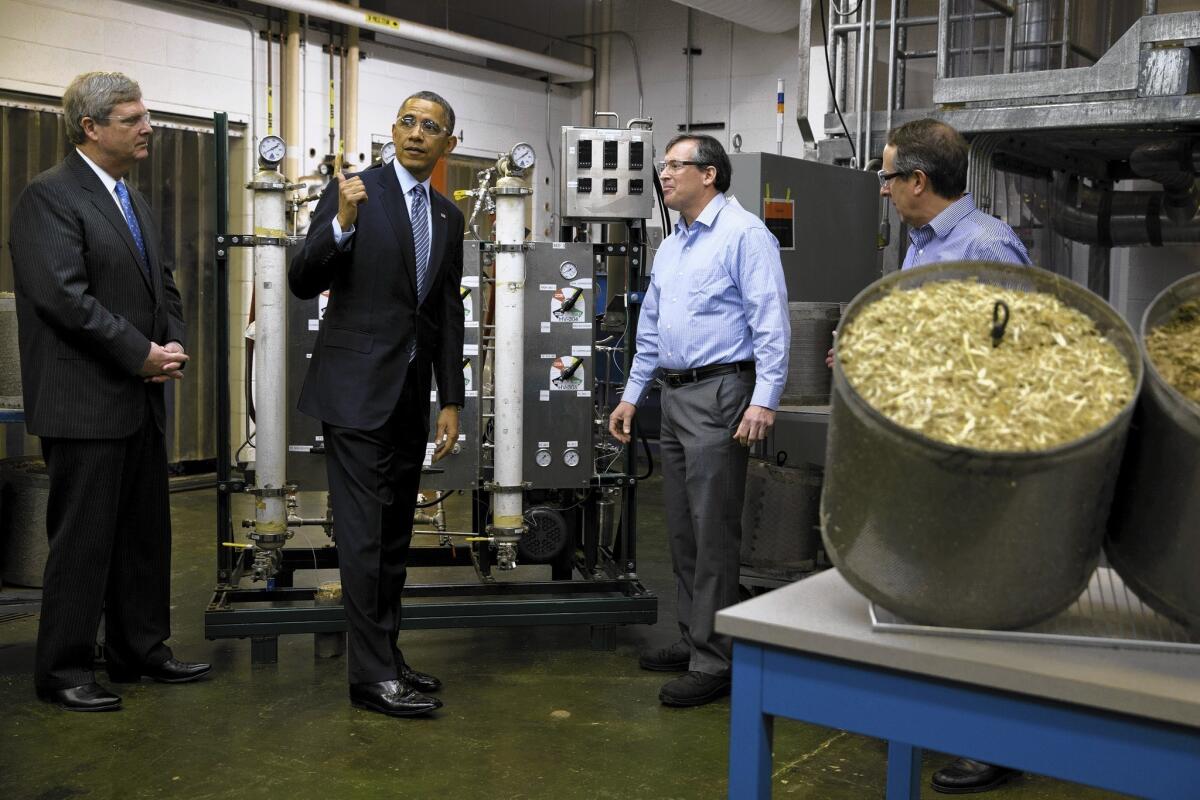President Obama travels to Michigan to sign farm bill

- Share via
EAST LANSING, Mich. — Keen not to let a rare legislative accomplishment go unnoticed, President Obama jetted to an agricultural research hub here Friday to sign into law a long-delayed farm bill and tout the importance of rural America to the economy.
In a brief trip to Michigan State University, Obama cited the bill as a victory for his economic agenda and a hopeful sign he could “break the cycle of short-sighted, crisis-driven, partisan decision-making.”
His message, however, was undermined by the release of a weak jobs report and a snub from Republican lawmakers who were invited to the unusual outside-Washington signing ceremony but did not attend.
The nearly $1-trillion bill, which had been logjammed for years in a divided Congress, passed this week. The Agricultural Act of 2014 sets policy for the next five years on crop subsidies, nutrition programs, conservation and food stamps. It also includes policies on cockfighting, biofuels, climate change and farmers markets.
Speaking at the university’s equine performance center, Obama described the legislation as an economic, environmental and agricultural bill rolled into one. “It’s like a Swiss army knife. It’s like a Mike Trout,” the president said, referring to the Angels center fielder who is known for his versatile skills. “It multitasks. It’s creating more good jobs — gives more Americans a shot at opportunity.”
As with most efforts in Washington, the bill had become tangled in the debate over government spending.
The final product was a compromise between Republican deficit hawks and Democrats seeking to protect safety-net programs. It cuts food stamps by $8 billion over the next decade, much less than the $40-billion reduction initially approved by the Republican-led House. The law puts an end to direct payments to farmers — a controversial program in which farmers received federal subsidies regardless of their output. The White House had argued that many payments went to wealthy farmers.
More than demonstrating hope for compromise on other measures, the event suggested the limits on bipartisan comity. The White House said it had invited about 50 lawmakers from both parties, but no Republicans showed up.
“Everyone invited has to speak for himself or herself about their decision to attend or not attend,” White House spokesman Jay Carney said. “Look, this was a bipartisan effort and everyone involved in it deserves credit. The president is happy to share credit for that.”
House Agriculture Committee Chairman Frank D. Lucas (R-Okla.) was invited, said Tamara Hinton, a spokeswoman, but “prior commitments in Oklahoma prevented him from attending.”
Lucas released a statement that called the bill a safety net for the food supply and for struggling Americans, but added that its focus was “rightly placed on reducing the size and cost of the federal government.”
The president toured the Michigan Biotechnology Institute, a subsidiary of the university that develops ways to process corn and wheat into biofuels, animal feed and other products. Wearing protective goggles, Obama walked amid the stainless-steel containers and pipes of the center’s fermentation facility.
“This is a very fancy pressure cooker,” he said to reporters trailing him.
Later, the president ran his fingers through a mulch-like material, which he said was a byproduct of corn.
“What we’re doing here is finding more efficient ways to convert it into usable pellets that can enhance the feeding of livestock, to a whole host of other things,” he said, describing the process as “energy-efficient and environmentally sound.”
Obama also had lunch with Detroit Mayor Mike Duggan. In September, the Obama administration offered a $300-million aid package to the financially troubled city and suggested there would be more. But the president did not come to Michigan with any additional federal help for the city.
Obama’s focus was on rural America, not urban Detroit. The president praised the farm bill for supporting rural growth and repeated his hope that this would be a rebound year for the economy.
The January jobs report released Friday showed lower-than-expected growth, but the nation’s unemployment rate dropped to 6.6%, the statistic the president chose to highlight in his speech.
“Our unemployment rate is now the lowest it’s been since before I was first elected,” Obama said before signing the farm bill on a stage with Michigan Sen. Debbie Stabenow and other Democratic lawmakers. “The companies across the country are saying they intend to hire even more folks in the months ahead. And that’s why I believe this can be a breakthrough year for America.”
The White House, seeking to focus on the farming sector as a bright spot in the economy, announced a new export initiative that includes a series of “Made in Rural America” forums to educate local governments and groups on how to promote exports.
The Department of Agriculture will train its employees to better advise producers on how to connect with foreign businesses, officials said, while the administration’s Rural Council, an advisory board, will convene a conference on investing in rural America.
kathleen.hennessey@latimes.com
More to Read
Sign up for Essential California
The most important California stories and recommendations in your inbox every morning.
You may occasionally receive promotional content from the Los Angeles Times.













